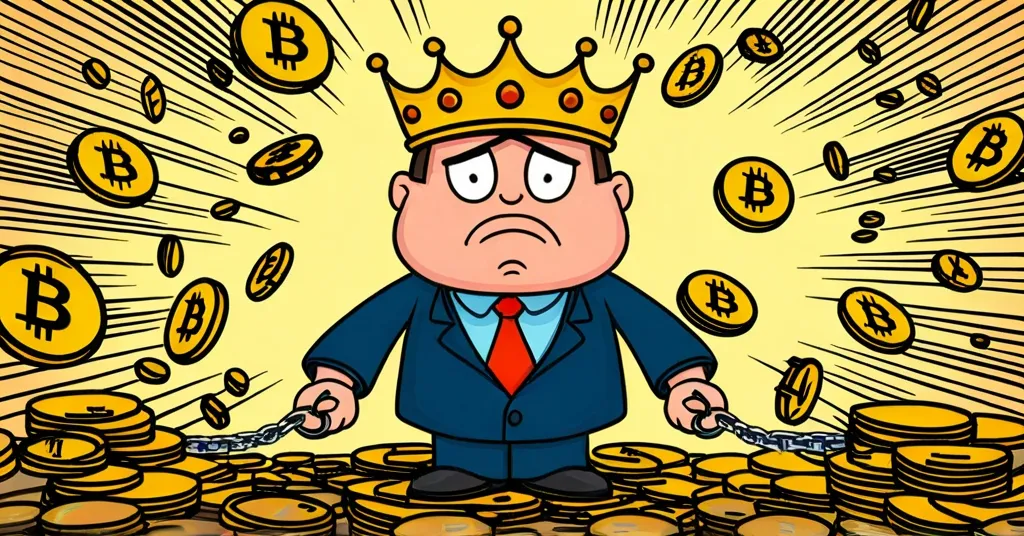South Korean “Coin King” Jonbur Kim Park Re-Arrested for $47M Artube Coin Fraud

South Korean Crypto Figure Jonbur Kim Park, “Coin King,” Re-Arrested for $47M Artube Coin Fraud
Jonbur Kim Park, the notorious “Coin King,” is back in custody after being re-arrested for a $47 million cryptocurrency fraud involving Artube coin, mere weeks after his release on bail for a previous scam. This latest incident not only showcases Park’s relentless deceit but also highlights the escalating challenge of crypto fraud in South Korea.
- Jonbur Kim Park re-arrested for $47M Artube coin fraud
- Previously involved in $14M Podo Coin scam
- Attempted to flee South Korea in December 2023
- Rise in crypto scams in South Korea
Shortly after his release on bail in January 2024, Park was ensnared once more by law enforcement, this time for masterminding a $47 million swindle with Artube coin. Together with his accomplice Moon, Park allegedly manipulated the coin’s price through false disclosures and coordinated efforts to deceive investors, resulting in devastating losses of 68 billion won. Park’s audacity is only outdone by his previous failed attempt to escape justice in December 2023, which ended in his capture.
Park’s repeated frauds serve as a stark reminder of the darker side of the cryptocurrency world. His earlier scam involved Podo Coin, leading to $14 million in losses for unsuspecting investors. Despite his flashy social media persona and the “Coin King” moniker, Park’s actions reveal a manipulative fraudster more focused on personal gain than the ideals of decentralized finance.
South Korea, renowned for its vibrant cryptocurrency scene, is currently facing a surge in fraud cases. Notable recent scams include a $7.9 million fraud involving a lawyer and a $60 million case that used misleading promotions and fake listings. These incidents underscore the sophisticated nature of scams in the crypto space, often involving automated trading bots that trade on their own and fake records on the blockchain.
In response to this growing problem, South Korean authorities are ramping up their efforts to combat crypto fraud. The re-arrest of Jonbur Kim Park and the ensuing legal repercussions are part of a broader initiative to restore investor trust and safeguard the integrity of the cryptocurrency market. This situation emphasizes the urgent need for robust regulatory measures and heightened investor education to mitigate these risks.
The global context of crypto scams is equally troubling. “Pig butchering” scams, which originate from large operations in Southeast Asia, involve building relationships with victims to convince them to invest in fraudulent opportunities. These scams have evolved from long-con schemes to quicker turnaround employment or work-from-home frauds, showcasing the adaptability and sophistication of fraudsters.
Internationally, efforts to combat these frauds are intensifying. For example, the International Criminal Police Organization (Interpol) coordinated a global operation in June 2024 to disrupt scam operations. The devastating impact of such frauds was highlighted in the Terraform case, which led to over $40 billion in investor losses, as noted by U.S. Attorney Daniel M. Gitner. FBI Assistant Director in Charge James E. Dennehy described the Terraform case as an example of a “crafted illusion” maintained over years to deceive investors:
The Terraform case is a prime example of a crafted illusion maintained over years to deceive investors.
As the crypto world evolves, the fight against fraud remains a critical challenge. While the promise of decentralization and financial freedom is enticing, it’s crucial to stay vigilant and informed. The case of Jonbur Kim Park, with its blend of audacity and deceit, serves as a sobering reminder of the risks lurking within the cryptocurrency sector.
Amidst these challenges, it’s important to recognize the potential of Bitcoin and other cryptocurrencies to revolutionize finance. Yet, the path forward is fraught with obstacles like those presented by individuals like Park. As we advocate for the ideals of decentralization, freedom, and privacy, we must also confront and address the darker sides of this financial revolution.
Protecting Yourself from Crypto Scams
To safeguard against similar frauds, consider the following tips:
- Research thoroughly before investing in any cryptocurrency.
- Be wary of promises of high returns with little risk.
- Use reputable exchanges and wallets.
- Stay informed about the latest fraud trends and security measures.
Key Takeaways and Questions
- What led to Jonbur Kim Park’s re-arrest?
Park was re-arrested on new fraud charges related to the manipulation of Artube coin, shortly after being released on bail for the Podo Coin scam.
- How significant is the financial impact of Park’s latest fraud?
The financial impact of Park’s latest fraud is estimated at 68 billion won, approximately $47 million.
- What methods did Park and Moon allegedly use to deceive investors?
They allegedly manipulated the price of Artube coin, used false disclosures, and engaged in coordinated efforts to deceive investors.
- What other notable crypto scams have occurred in South Korea recently?
Other notable scams include a $7.9 million scam involving a lawyer and a $60 million fraud case, both highlighting the use of misleading promotions and fake listings.
- How are South Korean authorities responding to the rise in crypto scams?
South Korean authorities are intensifying efforts to crack down on crypto fraud, ensuring legal repercussions for fraudulent actors in the industry.
- What are “pig butchering” scams?
“Pig butchering” scams involve building relationships with victims to convince them to invest in fraudulent opportunities, often originating from large operations in Southeast Asia.
- What international efforts are being made to combat crypto scams?
Interpol coordinated a global operation in June 2024 to disrupt scam operations, and various legal actions, such as the Terraform case, highlight the global fight against crypto fraud.



